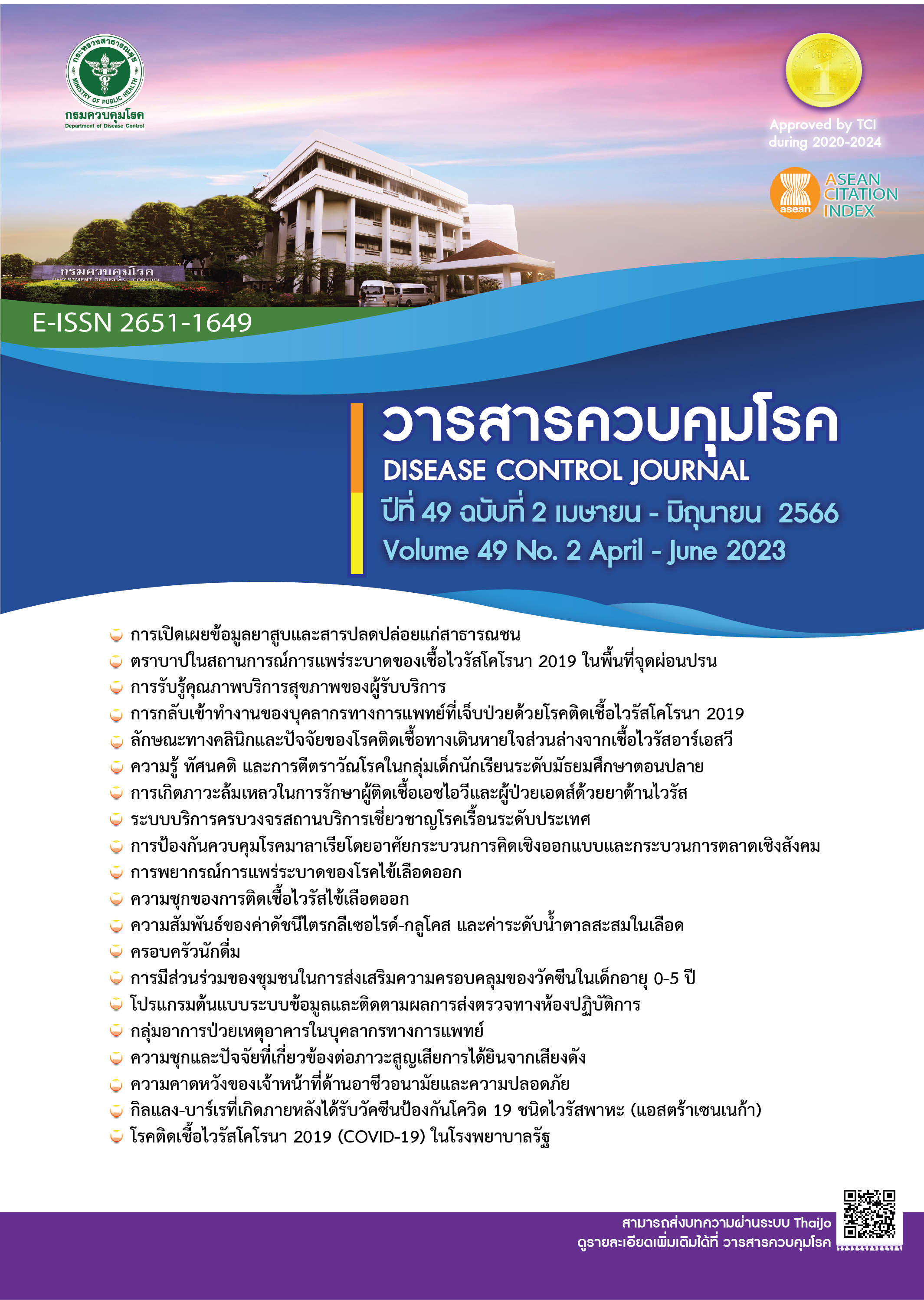Grey System Model for forecasting dengue outbreak: case study of Bangkok metropolis
DOI:
https://doi.org/10.14456/dcj.2023.30Keywords:
Grey System, Forecasting, DengueAbstract
The research aimed to 1) study the Grey system model for forecasting the dengue outbreak, 2) report on the accuracy of forecasting the dengue outbreak during 2018-2022, 3) use the information for decision-making with respect to planning, management and problem solving associated with dengue outbreaks. The sample group used in this study was the number of dengue cases in the areas under Bangkok Metropolitan Administration (BMA). Research tool was the Grey Theory, which was a suitable forecasting technique for the formatted data by the system GM (1, 1). Findings from this study indicated that: 1) The Grey system theory by the GM (1, 1) was suitable for forecasting the number of dengue infected people in Bangkok area; 2) The results of forecasting the number of patients during dengue outbreaks using the Grey Theory, a method in the GM (1, 1), were able to forecast the number of dengue cases with an accuracy of 98.62 percent, compared with the number of patients reported in 2020 by the BMA Health Department; and 3) The model accuracy inspection was the measurement of the error of actual value and the forecast value by using the co-efficient value or the number data, assuming the actual value was close to the forecast value or with minimal errors, which was the appropriate value for forecasting an accurate result. Regarding accuracy validation of the model, overall, the GM (1, 1) method was found to be accurate because this method achieved a MAPE statistical value of 6.10 percent.
Downloads
References
Department of Disease Control (TH), Division of Vector Borne Disease. Academic manual on dengue fever, 2001 [Internet]. [cited 2020 Dec 2]. Available from: https://drive.google.com/file/d/16t5uWzrl3MFelwQkYH8fiMyFs-uPt5eb/view (in Thai)
Yangkao K, Srakaew K. Dengue hemorrhagic fever forecasted by 5-dimension data user in 9th Regional Health Area. Dis Control J. 2015;41(3):208-18. (in Thai)
Gubler DJ. Epidemic dengue/dengue hemorrhagic fever: A global public health problem in the 21st century. Dengue Bulletin. 1997;21:1-19.
Hammon WM, Rudnik A, Sather GE. Viruses associated with epidemic hemorrhagic fever of the Philippines and Thailand. Science. 1960;131:1102-3.
Department of Disease Control (TH), Division of Vector Borne Disease. Dengue fever forecast report 2015 [Internet]. [cited 2020 Dec 2]. Available from: https://ddc.moph.go.th/uploads/publish/1026320220627144613.pdf (in Thai)
Department of Disease Control (TH), Division of Vector Borne Disease. Academic Manual on Infectious Dengue and Dengue Hemorrhagic in Medicine and Public Health 2015 [Internet]. [cited 2020 Dec 2]. Available from: https://drive.google.com/file/d/1N1U3LXuJGNJPRj 6kHDj4zaK9akOqkQ53/view (in Thai)
Rattanavipanon W. Article on Dengue fever 2012 [Internet]. [cited 2020 Dec 2]. Available from: https://pharmacy.mahidol.ac.th/th/knowledge/article/102/ (in Thai)
Strategy and Evaluation Department, Bangkok Metropolitan Administration. Statistical Profile of Bangkok Metropolitan Administration 2012 [Internet]. [cited 2020 Dec 2]. Available from: webportal.bangkok.go.th/upload/user/ 00000052/2020/Static/stat%202555(thai).pdf (in Thai)
Department of Disease Control (TH), Division of Vector Borne Disease. Situation of dengue fever, week 52, 2012-2016 [Internet]. [cited 2020 Dec 2]. Available from: https://drive.google.com/drive/folders/1TTaSvaYYamVwA5Ig7ATZJmIcHBuGXOSb (in Thai)
Deng J. Introduction to grey system theory. The Journal of grey system. 1989;1(1):1-24.
Akay D, Atak M. Grey prediction with rolling mechanism for electricity demand forecasting of Turkey. Energy. 2007;32(9):1670-5.
Kayacan E, Ulutas B, Kaynak O. Grey System theory-based models in time series prediction. Expert Systems with Applications. 2010;37(2):1784-9.
Liu S, Lin Y. Grey Systems Theory and Applications. Springer-Verlag Berlin Heidelberg; 2010.
Pasunon P, Tragantalerngsak S, Atthirawong W. Application of Grey system theory to evaluate performance in savings and credit cooperatives of higher education institutions in Bangkok. Research Methodology & Cognitive Science. 2016;14(1):44-58. (in Thai)
Department of Disease Control (TH), Division of Epidemiology. Dataset: Dengue fever patients, 2009-2016 [CD-ROM]. Nonthaburi: Division of Epidemiology; 2016. (in Thai)
Department of Health (Bangkok Metropolitan Administration). Situation of dengue fever, week 52, 2020 [Internet]. [cited 2021 Jul 29]. Available from: webportal.bangkok.go.th/upload/user/00000319/pdf/2563/Dengue_wk52_2020.pdf (in Thai)
Maleesri T. Prevention and control of Dengue hemorrhagic fever in risk area; Omyai case study [Independent Study]. Nakhon Pathom: Silpakorn University; 2009. 76 p. (in Thai)
Downloads
Published
How to Cite
Issue
Section
License
Copyright (c) 2023 Disease Control Journal

This work is licensed under a Creative Commons Attribution-NonCommercial-NoDerivatives 4.0 International License.
Articles published in the Disease Control Journal are considered as academic work, research or analysis of the personal opinion of the authors, not the opinion of the Thailand Department of Disease Control or editorial team. The authors must be responsible for their articles.






